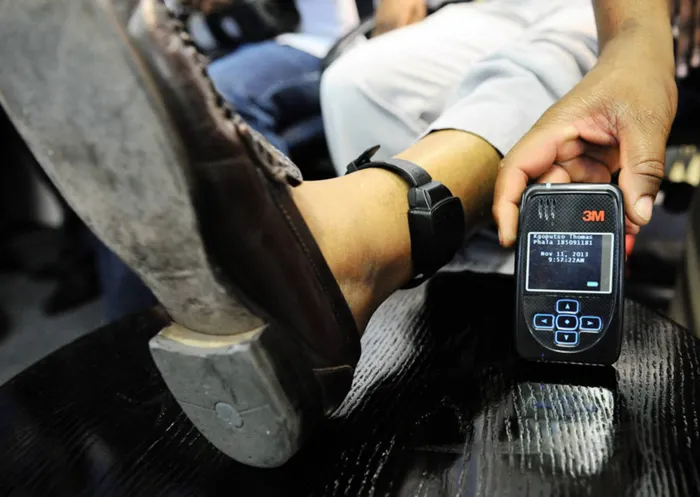Electronic monitoring for parolees on the cards

Minister of Correctional Services, Dr Pieter Groenewald confirmed they were exploring the return of Electronic Monitoring, to properly supervise parolees.
Image: File
Thirteen years after the first piloted Electronic Monitoring Project, Correctional Services Minister Pieter Groenewald confirmed they were exploring its return to supervise parolees.
The Department of Correctional Services (DCS) and the Council for Scientific and Industrial Research (CSIR) have collaborated for the reintroduction phase, which will be discussed at a summit next month on the revision of the parole system.
Together, they are developing 10 prototype bracelets for an Electronic Monitoring System (EMS), which is currently under scrutiny for its effectiveness.
Groenewald's spokesperson, Eune Oelofsen, last night confirmed the reintroduction was on the cards.
“Yes, the minister and the department is currently exploring the use of electronic monitoring systems to enhance the supervision of parolees. We are in the preliminary stages of implementation, and this initiative is a work in progress. We anticipate further discussions on this topic during the upcoming summit focused on the revision of the parole system scheduled for September.”
But Golden Miles Bhudu, national spokesperson for the SA Prisoners Organisation for Human Rights (SAPHOR), together with DA MP and Member on Security and Justice Nicholas Gotsell and GBV activists have criticised the move, saying it would be another failure and a waste of tax payers' money.
In 2012, DCS launched the Electronic Monitoring Pilot Project for 150 offenders, primarily those serving life sentences and in 2014, a prisoner became the first to be fitted with the device.
Groenewald said the department conducted tests on the devices at its Kgosi Mampuru II Management Area from November 2023 13 to January 31, 2024.
“The DCS and CSIR have collaborated in developing 10 prototype bracelets for an EMS,” he said in response to a parliamentary questionnaire posed by Gotsell.
“This is a research and development project to assess functionalities such systems integration, software back-end, location-awareness; and geographical fencing amongst others. Full development after proof on concept will ensure that South Africa owns the Intellectual Property rights and data derived from the system.
“The department conducted tests on the devices at its Kgosi Mampuru II Management Area from November 13, 2023 to January 31, 2024.
“The tests revealed further development requirements, which are being explored.
“Upon full development of the system, devices could be scaled to monitor the caseload of parolees and probationers under the department’s supervision. This would, however, be dependent on availability of funds to meet the requisite volumes.”
Bhudu said while they welcomed it, they had their reservations of its infringement of human rights of inmates.
“The SA Prisoners Organisation for Human Rights is in full support of the intention of the DCS to reintroduce the electronic tagging for ex-offenders to electronically tag parolees aimed at monitoring their whereabouts and movements of those who have been given a golden opportunity to serve the remaining sentence outside,” he said.
“The question is, what about the right of privacy and the human rights of the parolees?"
According to court documents, in 2023, former inmate of Westville Prison, Khishwa Cebekhulu sought R5.7 million in damages against the Minister of DCS in that the electronic monitoring device caused swelling to his lower limb leading to amputation and was successful in his legal plight.
Gotsell said while it was promising, it was up against a poor biometric identification system.
“One has to ask: how will they tag anyone if Correctional Services doesn’t even have accurate biometrics or reliable ID systems in place?
“If Correctional Services can’t track inmates inside prison walls, how will they possibly track parolees outside them? Electronic tagging means nothing if the department cannot even identify who they are tagging."
Candice van der Rheede, a GBV activist and founder of the Western Cape Missing Person’s Unit who led the search for missing Michaela Williams, 12, from Pelikan Park in 2020, said the tagging system would not help victims.
Michaela was found raped and murdered and her killer, parolee Steven Fortune, was sentenced to three life terms.
“How will these tags prevent them from committing crimes?” she asked.
"They are wasting money and resources.”
Siya Monakali of Ilitha Labantu said: “Electronic tagging offers a critical safeguard, ensuring that parolees are effectively monitored and held accountable for their movements. Concerns remain, however, that without proper oversight and accountability, this initiative risks collapsing in the same way as the failed Westville Prison pilot project almost a decade ago, which saw millions of taxpayers’ rands squandered through corruption and mismanagement. South Africans cannot afford another costly failure in the name of public safety, nor can survivors of violence endure the consequences of a justice system that prioritises expediency over accountability.”
Get your news on the go, click here to join the Cape Argus News WhatsApp channel.
Cape Argus
Related Topics: